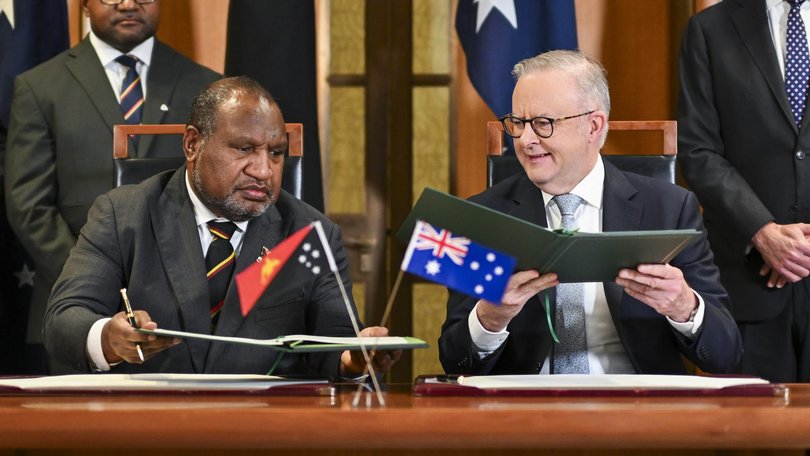PNG treaty with Australia signed but questions linger over Darwin Port lease to China amid security fears
New military alliance is a “construct of peace and not of war” as leaders dodge questions about China.

Papua New Guinea’s leader has declared a new military alliance with Australia is a “construct of peace and not of war” as he and Prime Minister Anthony Albanese dodged questions about China following a formal signing of the defence treaty in Canberra.
Under the sweeping Pukpuk Treaty, up to one in six members of the Australian Defence Force could eventually be from Papua New Guinea, with both countries agreeing to “act to meet the common danger” if either faces an armed attack.
Last month both prime ministers had hoped to formalise the deal in Port Moresby, but the move was delayed when PNG’s cabinet could not assemble a quorum because of celebrations for the 50th anniversary of independence.
Sign up to The Nightly's newsletters.
Get the first look at the digital newspaper, curated daily stories and breaking headlines delivered to your inbox.
By continuing you agree to our Terms and Privacy Policy.“It is Australia’s first new alliance in more than 70 years and only the third in our history, along with our alliances with the United States of America and New Zealand,” Mr Albanese said.
“Both of the nations have also agreed not to undertake any activities or enter into any agreements that would compromise the implementation of this treaty,” he added in a veiled reference to Beijing.
Asked whether the new treaty frames China as the enemy, Mr Albanese instead argued the document was simply about enhancing Australia’s relationship with its closest neighbour.
“This is about Australia and Papua New Guinea being good neighbours, the closest of neighbours, now the newest of allies. So, it’s about our relationship, recognises as part of it the sovereignty of other nations and is consistent with that.”
The visiting PNG leader, who last night joined Mr Albanese at the National Rugby League Grand Final in Sydney, insisted “this is not a treaty that sets up enemies, but consolidates friendships”.
“We maintain friendships to all, enemies to none. We’ll be advocates of peace in wherever we engage in, as far as our foreign relations are concerned,” Mr Marape told reporters.
Papua New Guinea’s Defence Minister Billy Joseph, who was also in Canberra for the signing, will soon travel to several regional nations including Indonesia and China to discuss the provisions of the newly finalised Pukpuk Treaty.
“Our defence minister will still be doing his visits to other nations that we relate with and to inform them that we choose to go down this path and hopefully they will accept our transparency in what we’re doing,” Mr Marape said.
“We will not keep it secret, Australia’s engagement with us is in this space.”
From next year permanent residents from Papua New Guinea already living in Australia will be eligible to join the ADF, with Prime Minister Marape last week signalling up to 10,000 from his country could eventually enlist here.
“Certainly, in terms of over a period of time, it could be really substantial numbers. They go through, they learn skills, both physical skills and obviously skills related to defence and military activity, but they pick up other skills as well,” Mr Albanese said.
Following the signing of the PNG treaty Mr Albanese declined to say whether Australia would seek to also lock in similar sweeping “mutual defence” provisions in any future military agreement with Fiji.
“We’ll work those things through. What we do is we work these issues through diplomatically, with respect, and that’s how we get results. And today we’ve got a cracker of a result,” Mr Albanese said.
Asked about the stalled progress in reaching another Pacific security deal with Vanuatu, Mr Albanese said he remained “confident” the proposed “Nakamal Agreement” would still be signed.
“We’ll work through these issues, but you know, we’ll work through it constructively as we do, respecting other nations as well.”
Questions linger on when Australia will end China’s lease of Darwin Port
While the Albanese government continues to compete with Beijing by striking further defence agreements across the Pacific, it’s declined to say when it expects to end a Chinese company’s lease of Darwin Port.
During this year’s election campaign, the Albanese Government pledged it would get the strategic northern maritime asset “back under Australian control”, but the lack of progress is causing frustration in the United States.
In 2015, Landbridge was awarded a 99-year lease of Darwin Port by the Northern Territory’s former Country Liberal Party government, a move which wasn’t opposed by Federal agencies but angered then US president Barack Obama.
On Monday The Nightly revealed US officials remain anxious about the arrangement and have warned that President Donald Trump could raise the matter when he meets Mr Albanese in Washington later this month.
Responding to the report, Defence Industry Minister Pat Conroy insisted the government was “working through it” in the same methodical way that delivered the military treaty with PNG.
“We are working through the process, it is commercially sensitive so we don’t want to get ahead of the decision making,” Mr Conroy told the ABC.

